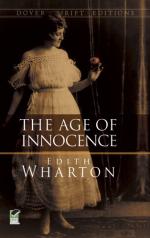“Oh, eminently,” Archer assented, pushing back the paper.
A day or two later, on responding to a summons from Mrs. Manson Mingott, his soul had been more deeply tried.
He had found the old lady depressed and querulous.
“You know she’s deserted me?” she began at once; and without waiting for his reply: “Oh, don’t ask me why! She gave so many reasons that I’ve forgotten them all. My private belief is that she couldn’t face the boredom. At any rate that’s what Augusta and my daughters-in-law think. And I don’t know that I altogether blame her. Olenski’s a finished scoundrel; but life with him must have been a good deal gayer than it is in Fifth Avenue. Not that the family would admit that: they think Fifth Avenue is Heaven with the rue de la Paix thrown in. And poor Ellen, of course, has no idea of going back to her husband. She held out as firmly as ever against that. So she’s to settle down in Paris with that fool Medora. . . . Well, Paris is Paris; and you can keep a carriage there on next to nothing. But she was as gay as a bird, and I shall miss her.” Two tears, the parched tears of the old, rolled down her puffy cheeks and vanished in the abysses of her bosom.
“All I ask is,” she concluded, “that they shouldn’t bother me any more. I must really be allowed to digest my gruel. . . .” And she twinkled a little wistfully at Archer.
It was that evening, on his return home, that May announced her intention of giving a farewell dinner to her cousin. Madame Olenska’s name had not been pronounced between them since the night of her flight to Washington; and Archer looked at his wife with surprise.
“A dinner—why?” he interrogated.
Her colour rose. “But you like Ellen—I thought you’d be pleased.”
“It’s awfully nice—your putting it in that way. But I really don’t see—”
“I mean to do it, Newland,” she said, quietly rising and going to her desk. “Here are the invitations all written. Mother helped me—she agrees that we ought to.” She paused, embarrassed and yet smiling, and Archer suddenly saw before him the embodied image of the Family.
“Oh, all right,” he said, staring with unseeing eyes at the list of guests that she had put in his hand.
When he entered the drawing-room before dinner May was stooping over the fire and trying to coax the logs to burn in their unaccustomed setting of immaculate tiles.
The tall lamps were all lit, and Mr. van der Luyden’s orchids had been conspicuously disposed in various receptacles of modern porcelain and knobby silver. Mrs. Newland Archer’s drawing-room was generally thought a great success. A gilt bamboo jardiniere, in which the primulas and cinerarias were punctually renewed, blocked the access to the bay window (where the old-fashioned would have preferred a bronze reduction of the Venus of Milo); the sofas and arm-chairs of pale brocade were cleverly grouped about little plush tables densely covered with silver toys, porcelain animals and efflorescent photograph frames; and tall rosy-shaded lamps shot up like tropical flowers among the palms.




